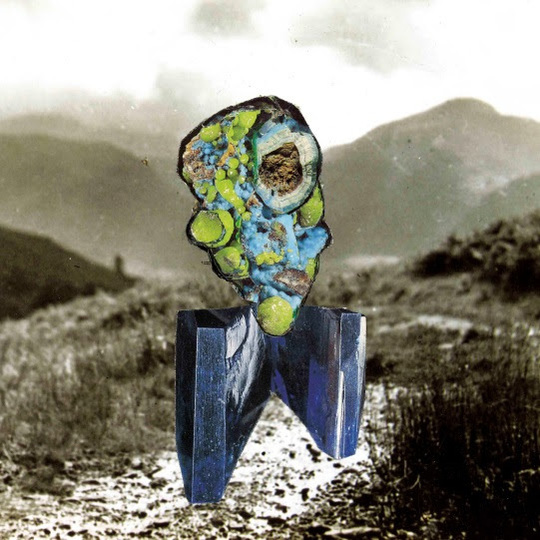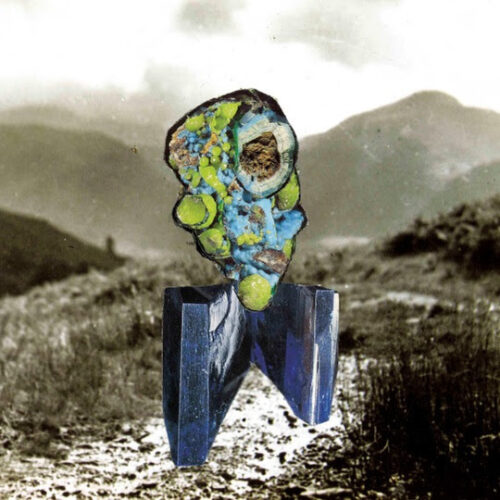Richard Dawson has been gaining some much deserved attention in the press over the last year. His 2014 album on Dominio imprint Weird World, Nothing Important, received a raft of praise for its rich and idiosyncratic style. It is timely, then, that The Magic Bridge and The Glass Trunk have been reissued, enabling new fans to track Dawson’s evolution as musician and songwriter. Both albums are relatively contemporary for reissues, having seen release in 2011 and 2013 respectively, and show Dawson patiently refining his singular technique over time. There is something reassuring about the consistency of these albums and Nothing Important; it feels very much the case that Dawson has been politely waiting for the world to catch up with him.
Dawson’s work is difficult to classify without gross simplification: it is built around acoustic guitar and vocals, borrowing elements of folk traditions both from the North of England and further afield. The amplified acoustic guitar occasionally recalls Bill Orcutt, but Dawson’s playing owes more to the fluency of British folk players like Michael Chapman. This is particularly evident on The Magic Bridge. The finger-picking of ‘The Bamburgh Beast’ would not seem out of place on Chapman’s Trainsong. Such a comparison, however, is also a red herring. One of Dawson’s defining features, as well as one his greatest merits, is the manner by which he will unhinge saccharine melody lines with angularity. A note may be uncomfortably bent, or purposefully detuned, while the aggressive attack of a particular musical section will spring into sudden and sharp contrast to the preceding moments. It comes close to the playing of Derek Bailey at times, without becoming a simple act of emulation. Dawson is a musician who understands form, but also appreciates the exhilaration that comes from wilful and playful departure, as if straining at a leash.
It is important to note the presence of harp player Rhodri Davies on The Glass Trunk, as his improvisations with Dawson weave between the acapella songs. Davies has credited Dawson with having helped him find the amplified tone for his own excellent 2012 album Wound Response, and it is clear that the two have a shared fondness for offsetting discord and melody against one another. The collaborative pieces are often the most compelling, giving Dawson a foil for his meandering. Compared to the work on The Magic Bridge these pieces tend to be shorter, allowing the contrasts to be felt more distinctly through the way Dawson’s guitar interacts with Davies’ sudden eruptions on the harp. These elements of The Glass Trunk embody all the best qualities of free improvisation: serious and committed, but with a glint of humour about them. Hopefully the growing interest in both artists’ work may see a reissue of their collaborative Dawson-Davies: Hen Ogledd LP as well.
Dawson’s singing showcases a thrilling range of dynamics on both albums. He bellows through ‘The Brisk Lad’, a re-interpretation of a folk song sung previously by Ewan MacColl and Mike Waterson, the ragged gravitas of his voice imbuing the lyrics with weary defiance. Elsewhere, the whispered intensity of “Joe The Quilt Maker" wavers close to a limit, almost breaking. It is a tender, sensitive rendering, causing the listener to feel bound to every frayed detail. The Glass Trunk draws its source material from Dawson’s commission from the Tyne and Wear Archives, taking an earth-worn quality, and highlighting the ability of an archive to render the specific historical details into weird new forms. These are places and people of a definite time, though Dawson’s narratives give them enough fluidity that they could be places and people of any time, feeling things common to all of us. In that sense, Dawson’s lyrics are categorically attached to a folk tradition, even when on The Magic Bridge they link to something contemporary. He sings of a wooden bag and its contents in painstaking detail on ‘The Wooden Bag’ ("half a dozen of those tiny Ladbrokes’ pens"), and it manages to invoke a wealth of common emotions: the sentimental attachment we develop for the seemingly mundane, the difficulty of detaching, and a sense of projected mournfulness.
What sets Dawson apart from many contemporary folk singers is quite how remarkably and consistently he manages to pull this sort of thing off. The songs are imbued with something as much about Eldon Garden shopping centre, or the maudlin austerity of a BHS café, as the usual folk clichés of overcast gallows hills and civil war battle sites. There is something in his intensity, and his familiarity that enables Dawson to render all this in a common, but inventive form. It is inexplicable, and it makes these reissues indispensable for those interested in what contemporary lyricism can do beyond boys telling the world what a big deal they are. The current cultural obsession with faux-folk ‘authenticity’ is something much written about and discussed, not least on this website, and it is refreshing to encounter Dawson’s complex mixture of vulnerability and tough sincerity. His resistances are not antagonistic, and one doesn’t suspect he has a manifesto for our consideration, but there is something vital and politically important about the nature of his disposition. These two albums, along with Nothing Important, form a powerful riposte to anyone presently dismissing folk as the sole domain of Mumford and Magners Incorporated.
<div class="fb-comments" data-href="http://thequietus.com/articles/19434-richard-dawson-the-magic-bridge-the-glass-trunk-review” data-width="550">



